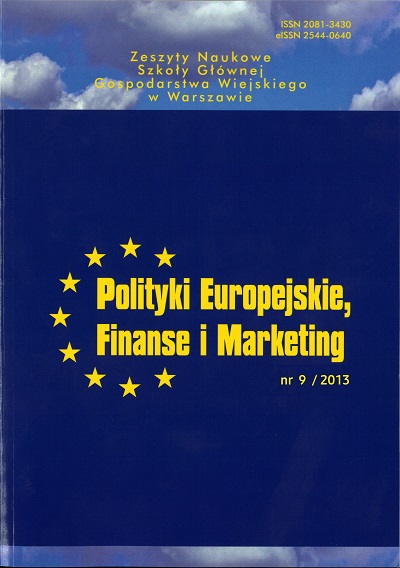Main Article Content
Article Details
Baran J.: Metody uzupełniania zapasów w spółdzielni mleczarskiej - stadium przypadku, Roczniki Naukowe SERiA, t. XI, z. 1, 2009.
Barney J. B., Hansen M. H.: Trustworthiness as a Source of Competitive Advantage, "Strategic Management Journal", 1994, Vol. 15. (Crossref)
Best Global Brands 2012, http://www.interbrand.com/en/best-global-brands/2012/BestGlobal-Brands-2012-Brand-View.aspx (stan na dzień 4 lutego 2013 r.).
Chowdhury S.: The role of affect- and cognition-based trust in complex knowledge sharing, "Journal of Managerial Issues Publisher", 3(Fall)/2005, Vol. 17.
Doney P. M., Cannon J. P., Mullen M. R.: Understanding the Influence of National Culture on the Development of Trust, "The Academy of Management Review", 7(July)/1998, Vol. 23. (Crossref)
Dowling G. R.: Corporate Reputations: Should You Compete on Yours, "California Management Review", 3/2004, vol. 46. (Crossref)
Ernst & Young: 39 proc. Polaków nie ufa bankom, http://biznes.gazetaprawna.pl/artykuly/636705,ernst_young_39_proc_polakow_nie_ufa_bank om.html (stan na dzień 31 stycznia 2013).
Grudzewski W. M., Hejduk I. K., Sankowska A., Wańtuchowicz M.: Zarządzanie zaufaniem w organizacjach wirtualnych, DIFIN, Warszawa 2007.
http://finance.yahoo.com (stan na dzień 4 lutego 2013 r.).
http://ycharts.com/companies/KO/assets (stan na dzień 4 lutego 2013 r.).
Kłusek-Wojciszke B., Łosiewicz M.: Poziom zaufania społecznego w nowych krajach Unii Europejskiej: kwestia kultury czy ekonomii?, "Pieniądze i Więź", 1/2009.
Kopaliński W.: Podręczny słownik wyrazów obcych, OFICYNA WYDAWNICZA RYTM, Warszawa 1999.
Mruk H., Pilarczyk B., Szulce H.: Marketing. Uwarunkowania i instrumenty, WYDAWNICTWO AKADEMII EKONOMICZNEJ W POZNANIU, Poznań 2007.
Ostruszka Ł.: Ile zarabiają wróżki i dlaczego tak dużo?, http://www.pb.pl/foto/2892143,97090,56609,23673 (stan na dzień 7 lutego 2013 r.).
Paliszkiewicz J. O.: Trust Management: Literature Review, "Management", 4(Winter)/2011, Vol. 6.
Parthemer M. R.: Whom Do You Trust? Six Nontax Factors to Consider When Selecting a Trustee, "Journal of Financial Service Professionals", 11(November)/2011.
Petraf M.: The Cornerstones of Competitive Advantage: A Resourced-based View, "Strategic Management Jurnal", 14/1993. (Crossref)
Polacy najmniej ufnymi pracownikami w Europie, http://www.bankier.pl/wiadomosc/Polacynajmniej-ufnymi-pracownikami-w-Europie-2703656.html (stan na dzień 31 stycznia 2013).
Raport Polska 2030. Wyzwania rozwojowe, http://zds.kprm.gov.pl/raport-polska-2030wyzwania-rozwojowe (stan na dzień 7 lutego 2013 r.).
Słownik języka polskiego PWN, http://sjp.pwn.pl (stan na dzień 30 stycznia 2013).
Sztompka P.: Zaufanie: Warunek podmiotowości społeczeństwa [w:] Oblicza społeczeństwa, praca zbiorowa pod red. K. Gerlacha i Z. Seręgi, WYDAWNICTWO UNIWERSYTETU JAGIELLOŃSKIEGO, Kraków 1996.
Transparency International, http://www.transparency.org/cpi2012/results (stan na dzień 7 lutego 2013 r.).
Urbanek G.: Kompetencje a wartość przedsiębiorstwa. Zasoby niematerialne w nowej gospodarce, OFICYNA A WOLTERS KLUWER BUSINESS, Warszawa 2011.
Zarządzanie marketingowe w polskich przedsiębiorstwach. Stan, zastosowania, tendencje i kierunki zmian, t. 1: Raport z badania, pod red. S. Kaczmarczyka, WYDAWNICTWO UNIWERSYTETU MIKOŁAJA KOPERNIKA, Toruń 2002.
Zaufanie społeczne. Komunikat z badań, http://www.cbos.pl/SPISKOM.POL/2012/K_033_12.PDF (stan na dzień 30 stycznia 2013).
Downloads
- Anna Śleszyńska-Świderska, Polish consumer tendencies in economic crisis , The Scientific Journal European Policies, Finance and Marketing: No. 9(58) (2013)
You may also start an advanced similarity search for this article.

This work is licensed under a Creative Commons Attribution-NonCommercial 4.0 International License.
All articles published in European Policies, Finance and Marketing are fully open access. In this way, the scientific research results contained in articles published in our journal are available to every reader free of charge - in accordance with the CC BY-NC license (https://creativecommons.org/licenses/by-nc/4.0/).
According to the CC BY-NC license you are free to:
- Share — copy and redistribute the material in any medium or format
- Adapt — remix, transform, and build upon the material
The licensor cannot revoke these freedoms as long as you follow the license terms.
Under the following terms:
- Attribution — You must give appropriate credit , provide a link to the license, and indicate if changes were made . You may do so in any reasonable manner, but not in any way that suggests the licensor endorses you or your use.
- NonCommercial — You may not use the material for commercial purposes .
- No additional restrictions — You may not apply legal terms or technological measures that legally restrict others from doing anything the license permits.
Source: https://creativecommons.org/licenses/by-nc/4.0/deed.en
According to that, the authors retain the copyright and full publishing rights.





